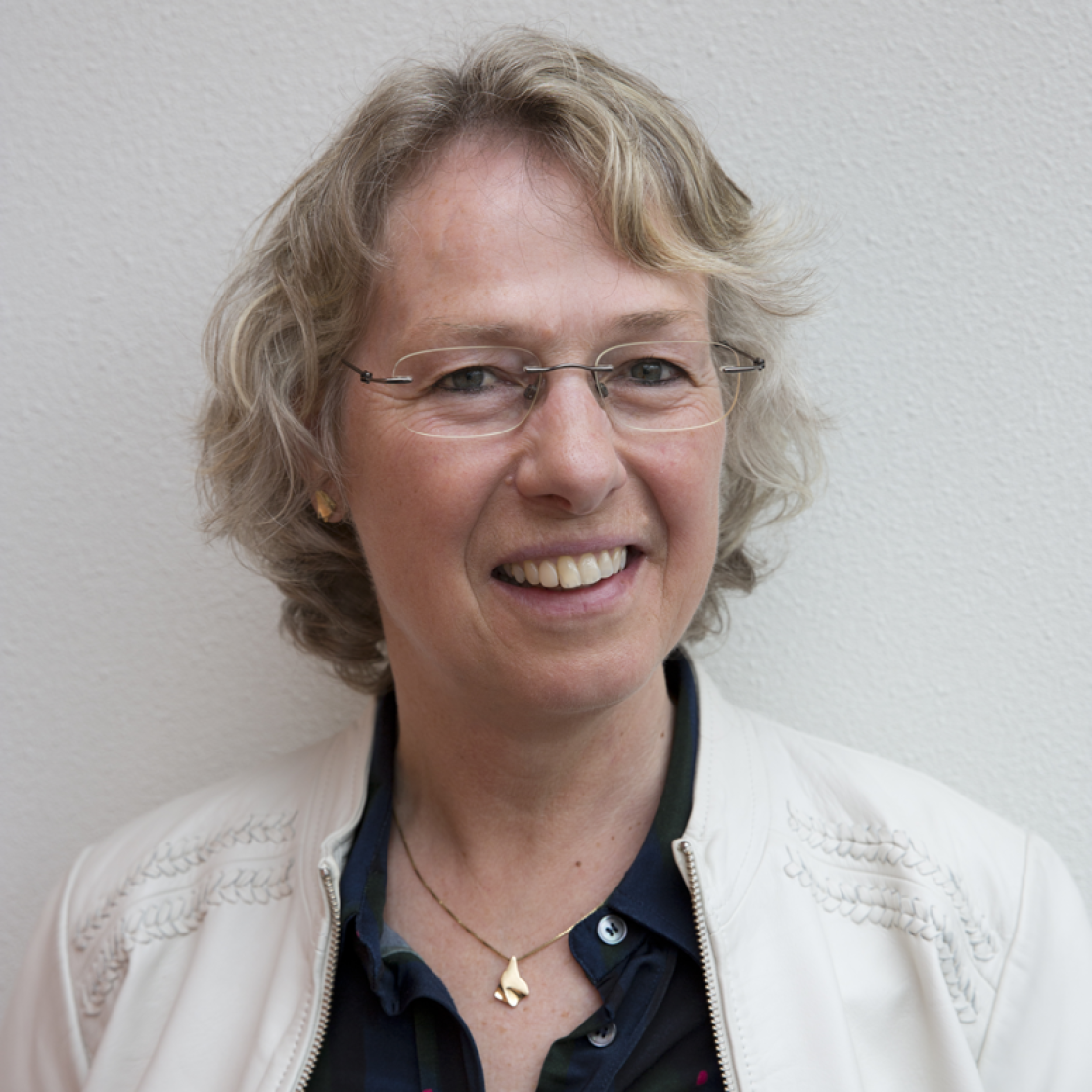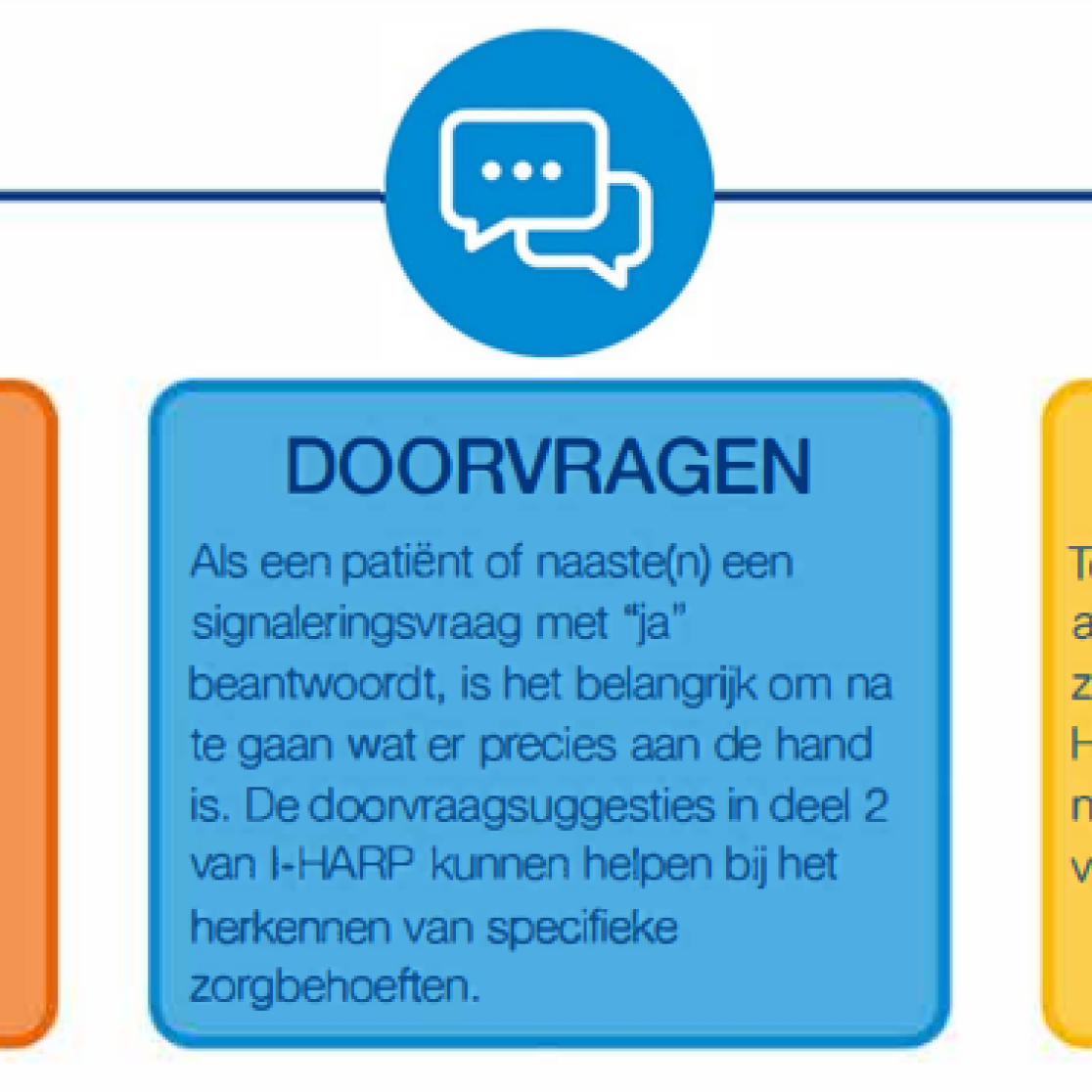“It’s so important to involve patients in this type of research”

I-HARP adapted for COPD
I-HARP is a tool to help healthcare providers timely identify and address the palliative care needs of people with heart failure. CAPHRI is currently conducting research aimed at adapting I-HARP to a similar tool for people with COPD. “It’s so important to involve patients and their families in this type of research”, says Mariëtte Simons.
As a person with heart failure, she was closely involved in the development of I-HARP. The tool was designed for people with severe forms of heart failure. They live with symptoms such as shortness of breath and fatigue and have an uncertain life expectancy. As their condition gradually worsens, they become increasingly dependent on care and their world becomes smaller. Treatment of patients with heart failure tends to focus on the physical/medical aspects of care. I-HARP helps healthcare providers timely recognise whether these patients would benefit from palliative care.

I-HARP (Recognizing palliative care needs in patients with advanced heart failure)
- Start project: 2018
- This project has received funding from: ZonMw
- Project website
Quality of life
"Many people associate palliative care with terminal care, but that’s not what this research project is about”, explains project leader Daisy Janssen, professor in old age medicine. “The tool empowers healthcare providers to start a conversation about a patient’s need for care that improves their quality of life. In other words, what does the patient need to feel better? It’s about much more than just physical symptoms. I-HARP is an accessible way to help healthcare providers ask questions about things like the impact of a patient’s disease on their mental health, social life and sense of purpose. This varies from person to person”, says the professor, who specialises in personalised care for people with advanced chronic organ failure. I-HARP consists of three parts. The first part contains a number of open-ended questions to start the conversation and close-ended questions to identify the need for palliative care. The second part contains suggestions for additional questions. Finally, the third part contains tips and advice to address the care needs identified.
Equal member
Mariëtte Simons suffers from heart failure, which runs in her family. She was approached to become involved in the I-HARP research project when she was a member of the Patient’s Advisory Board at Harteraad, the Dutch centre of expertise for people living with cardiovascular disease. She finds it very important that doctors or other healthcare providers timely raise the subject of palliative care needs with persons with heart failure. “That’s why I wanted to participate in the study. I know from experience that what the doctor thinks is important for a patient often differs from what the patient thinks. On top of that, doctors can be fascinated by the heart itself, but they also need to see the patient as a human being.”
The tool was not only developed in partnership with patients and their families, but also tested by them. “I tested it, too”, says Mariëtte Simons. “I really felt like an equal member of the research team. I was a good match with Stephanie Ament, a researcher involved in the project. She and I also provided workshops on I-HARP for healthcare providers, such as nurses, together.” Daisy Janssen nods. “Stephanie went into the project with an open mind. She was not biased by any preconceived notion of what the tool should look like. She was receptive to the ideas of people with heart failure.”

Contact
Principal investigator: Prof.dr. Daisy Janssen
daisy.janssen@maastrichtuniversity.nl
Tool for people with COPD
The project resulted in a great tool, says Mariëtte Simons. “It facilitates in-depth conversations about all kinds of topics. The tool also meets the needs of the diverse patient population.” A research project to adapt I-HARP for people with chronic obstructive pulmonary disease (COPD) was initiated last year in collaboration with nurse and nurse scientist Daniël Huijten at Zuyderland Medical Center, with funding from the Dutch Foundation for Asthma Prevention. “As with persons with heart failure, the disease trajectory of persons with COPD is unpredictable and the prognosis is uncertain. Persons with COPD do tend to be a bit younger, which means they have other concerns. These differences will be reflected in the tool”, says Daisy. Stephanie, now staff adviser person-centred care at the Maastricht University Medical Centre+, will advise on the project.
Finally, Daisy says that she and the Centre of Expertise for Palliative Care also plan to study how best to implement these tools, and what impact they have on patients and their families, healthcare providers and healthcare costs. “I don’t think we should develop a new tool for each disease, though. It would be better to develop a generic tool with specific questions for specific diseases.”
Text: Karin Burhenne
Translation: Emdash

Mariëtte Simons, Harteraad
Research team
- Daisy Janssen, Professor of old age medicine, specifically with focus on personalized care for patients with serious chronic organ failure, CAPHRI / Maastricht University and Ciro
- Stephanie Ament, researcher care innovation and implementation and staff adviser person-centred care at MUMC+
- Marieke van den Beuken - Van Everdingen, Professor in Palliative Medicine, Centre of Expertise for Palliative Care MUMC+
- Yvonne Engels, Professor of Meaningful healthcare, RadboudUMC
- Hans-Peter Brunner-La Rocca, Professor in Cardiology with a focus on Clinical Heart Failure, MUMC+
- Josiane Boyne, Coordinating heart failure nurse specialist and researcher, MUMC+
- Louise Bellersen, cardiologist at RadboudUMC, chair guideline ‘Palliatieve zorg bij gevorderd hartfalen NYHA-klasse III-IV’
- Jelle Stoffers, General Practitioner and Associate Professor of Family Medicine, CAPHRI, / Department of Family Medicine MUMC+
- José Maessen, staff adviser quality, innovation and research, MUMC+
Involved Research Line
- Ageing and Long-Term Care
Involved Living Lab
Involved partners
- Maastricht University Medical Centre+, Centre of Expertise for Palliative Care
- RadboudUMC
- Harteraad, Dutch centre of expertise for people living with cardiovascular disease


Our most important societal relevance output
- I-HARP tool: Tool for timely identification of palliative needs in heart failure
- I-Harp e-learning modules for healthcare professionals
- I-HARP workshop for healthcare professionals
- Implementation advice for hospitals
- Several lay summaries of scientific publications
- Interview Daisy Janssen for ZonMW

Our most important scientific output
- Characteristics for a tool for timely identification of palliative needs in heart failure: The views of Dutch patients, their families and healthcare professionals. European Journal of Cardiovascular Nursing. Janssen, D. J., Ament, S. M., Boyne, J., Schols, J. M., Rocca, H.-P. B.-L., Maessen, J. M., & van den Beuken-van Everdingen, M. H. (2020).
- Tools to help healthcare professionals recognize palliative care needs in patients with advanced heart failure: a systematic review. Stephanie MC Ament, Inge ME Couwenberg, Josiane JJ Boyne, Jos Kleijnen, Henri EJH Stoffers, Marieke HJ van den Beuken, Yvonne Engels, Louise Bellersen8 and Daisy JA Janssen. Palliative Medicine 2020.
- Professionals guidance about palliative medicine in chronic heart failure: a mixed-method study. Stephanie MC Ament, Marieke van den Beuken-Everdingen, Jose MC Maessen, Josiane Boyne, Jos MGA Schols, Henri EJH Stoffers, Louise Bellersen, Hans-Peter Brunner-La Rocca, Yvonne Engels, Daisy JA Janssen. BMJ Supportive & Palliative Care 2020-002580.
- Hartfalen. Tijdig inventariseren van palliatieve zorgbehoeften. Dr. S. Ament, dr. J. Boyne, dr. R. Willemsen, drs. N. Uszko-Lencer, prof.dr. M. van den Beuken-van Everdingen en dr. D. Janssen. Pallium, jaargang 22, nummer 2, april 2021
- What to consider when implementing a tool for timely recognition of palliative care needs in heart failure: a context-based qualitative study Stephanie M. C. Ament, Lisette M. van den Broek, Marieke H. J. van den Beuken‑van Everdingen, Josiane J. J. Boyne, José M. C. Maessen, Sebastiaan C. A. M. Bekkers, Louise Bellersen, Hans‑Peter Brunner‑La Rocca, Yvonne Engels and Daisy J. A. Janssen. BMC Palliative Care (2022) 21:1
- Implementatietips voor tijdig signaleren palliatieve zorgbehoeften bij gevorderd hartfalen. Hester d’Engelbronner en Pien Eras, Alumni Maastricht University, Daisy Janssen, hoogleraar ouderengeneeskunde Maastricht University en Ciro, Horn, Judith Coolen-Essers, hartfalenverpleegkundige, Nicole Uszko-Lencer, cardioloog en Stephanie Ament, stafadviseur Persoonsgerichte Zorg, MUMC+. Cordiaal 3/2022